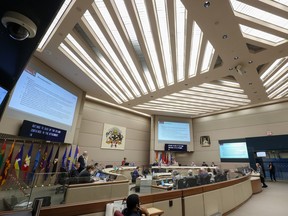With the plebiscite rejected, the issue will go to a public hearing next month as initially planned

Article content
Calgarians will not have the opportunity to vote in the upcoming municipal election on the city’s omnibus rezoning proposal, city councilors decided Wednesday afternoon.
During a special meeting Wednesday, the council voted 8-6 to reject a motion to send its proposed new zoning policy to a plebiscite, which would have added the issue to the ballot during the 2025 municipal election. Mayor Jyoti Gondek called the special meeting after a review of the plebiscite proposal on Tuesday.
Advertisement 2
Article content
Article content
The city is proposing to change its residential zoning district from base to infill-oriented residential grade (RC-G) in an attempt to increase housing density in neighborhoods currently zoned for single-family homes. The change is based on recommendations from the housing strategy council approved in September.
The RC-G district would allow homeowners to develop medium-density housing, such as duplexes and townhomes, without first applying to the city for a land use change.
Once the plebiscite is rejected, the issue will go to a public hearing next month as initially planned.
Count. Dan McLean tabled the notice of motion earlier this month with the support of councilors Sonya Sharp, Terry Wong, Andre Chabot, Sean Chu and Peter Demong, the same six who voted in favor of the plebiscite on Wednesday. McLean pointed to other key issues that came up for plebiscites in Calgary, such as the rejected bid for the 2026 Olympics and the successful vote to add fluoride back to the city’s tap water.
“I think this is even more consequential as it affects everyone in Calgar,” McLean said during the meeting. “And remember, not a single council member ran for the blanket rezoning in this last election. “I think we need a mandate from the people to do what is proposed.”
Article content
Advertisement 3
Article content
Recommended by Editorial
-

Calgary councilors to hold special meeting to discuss rezoning plebiscite
-

Councilors intend to take a citywide rezoning proposal to a plebiscite
-

Housing will remain one of Calgary council’s priorities in 2024, says Gondek
-

Calgary council votes in favor of housing strategy after marathon three-day meetings
The results of the plebiscite would have been non-binding and would still have required a public hearing.
Councilors in favor of the plebiscite argued that a blanket rezoning would preclude holding public hearings on individual properties for future land use changes.
“Every time we hear a land use redesignation request, we hear from community members with real concerns about the effect these new requests will have on their neighborhood and their lives,” Coun said. Sharp. “They can speak directly and unfiltered to the people they elected to make those decisions on those applications on their behalf…what is proposed would eliminate that opportunity.
“This blanket rezoning is not only a significant change in how we grow, but also in the process we use to get there and how we see people participating in it.”
Advertisement 4
Article content
Public hearing will be held on April 22
Gondek and some other council members who voted against putting the matter to a vote compared a plebiscite to “kicking the can down the road.” Councilors said next month’s public hearing will give the public a chance to express their views and the “why” behind them, rather than the simple yes or no that a plebiscite would offer.
“We believe it is necessary to listen to the public. The public has been informed that April 22 is the date of the public hearing,” Gondek said, noting that the city has spent nearly $1 million to engage the public ahead of that meeting. “We have cleared the week so that as many people who want to come and give their opinion can do so.”
Count. Wong proposed an amendment to postpone the public hearing until June, but it was rejected by 11 votes in favor and 3 against. She said despite the city’s commitment, there is still a lack of understanding among the public on the issue.
“I want you to hear the facts. I want to hear the implementation. I want them to hear the ramifications and impacts of this,” Wong said.
Critics of the proposed zoning policy have claimed that the change would alter the character of existing neighborhoods and lead to overdevelopment, while advocates have claimed that it will limit suburban sprawl and improve housing affordability.
A large turnout is expected for next month’s public hearings, as councilors have received hundreds of emails on the issue.
Article content




